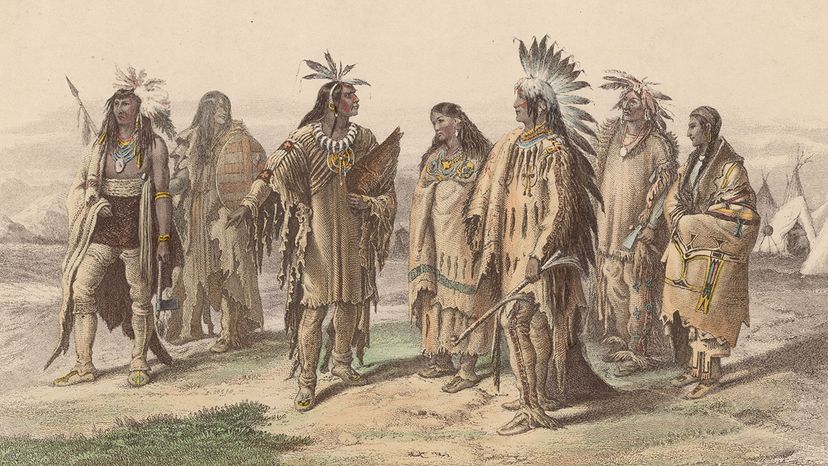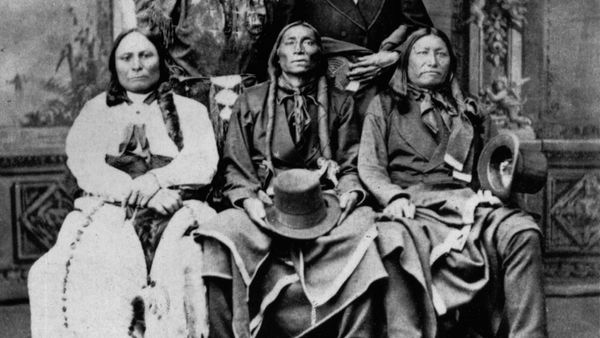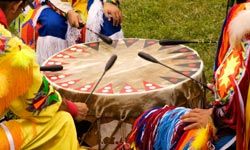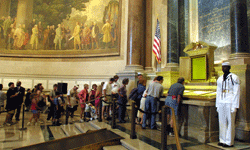
Back in 1744, colonial leaders from Pennsylvania, Virginia and Maryland met with a delegation from what at the time was one of the great powers on the North American continent. It was a confederation of Native American nations who called themselves the Haudenosaunee, though we're more familiar with them by their French name, the Iroquois. As recounted in James Wilson's book "The Earth Shall Weep: A History of Native America," the native leader Canastego expressed frustration at the colonists' quarreling with one another.
"We heartily recommend Union and a good agreement between you, our brethren," he admonished the colonists. He advised that they follow the example of the Iroquois who had established a well-organized system of self-government, codified in the Great Law of Peace, with both a central council and checks and balances that protected individual freedoms. "We are a powerful confederacy, and by observing the same methods our wise forefathers have taken, you will acquire fresh strength and power."
Advertisement
Among those in attendance was Benjamin Franklin, who in Wilson's account took careful notes and later used some of the Iroquois' ideas about government a decade later in a proposal for a confederation of the American colonies. If "ignorant savages" could form such an effective union, Franklin wrote in a 1751 letter, the "English colonies" should be able to do the same. The Albany Plan championed by Franklin never came to fruition, but the notion of the colonies cooperating and governing themselves was a big step toward what eventually became the United States of America.
Over the years, some have argued that we ought to give the Iroquois credit for inspiring the birth of American democracy, and even have suggested that the U.S. Constitution and the system of self-government that it created actually was based upon the Iroquois Great Law.
If you poke around the internet or social media long enough, you may even find the meme depicted in this 2014 PolitiFact article, which claims that the U.S. Constitution "owes its notion of democracy to the Iroquois Tribes, including freedom of religion, freedom of speech, and separation of powers in government." The big difference, the meme notes, is that unlike the Founding Fathers, the Iroquois didn't disenfranchise nonwhites and women.
The point about women is clearly true. Women are mentioned throughout the Great Law, and in the Iroquois system of government, they had the power to select chiefs and veto wars. In this 2016 Washington Post essay, journalist Jessica Nordell writes that 19th century American feminists such as Elizabeth Cady Stanton, who had Iroquois neighbors in upstate New York, were inspired by their notion of gender equality.
Congress even passed a resolution in 1988, acknowledging the Iroquois contribution to American democracy, and noting that "the original framers of the Constitution, including, most notably, George Washington and Benjamin Franklin, are known to have greatly admired the concepts of the Six Nations of the Iroquois Confederacy." The resolution also noted that "the confederation of the original Thirteen Colonies into one republic was influenced by the political system developed by the Iroquois Confederacy as were many of the democratic principles which were incorporated into the Constitution itself."
Nevertheless, the consensus among historians seems to be that there's no compelling evidence that the Founding Fathers directly imitated the Iroquois Great Law when they wrote the U.S. Constitution. As PolitiFact details, the Iroquois system had some significant differences from the political system that the former colonists created. For one, the Iroquois had hereditary office-holders, something that more resembled the English system that the Americans were rebelling against.
"There are lots of significant and fascinating ways in which one can trace the interactions between indigenous and settler populations," Stanford University history and political science professor Jack Rakove, author of the 2017 book "A Politician Thinking: The Creative Mind of James Madison," writes in an email. "But the transmission of political ideas — including ideas about democracy — is not one of them. The basic fact is that the colonists were direct heirs to an extremely rich body of political practices and ideas derived from English history, and especially from the great controversies of the 17th-century Stuart era. There just is not much, if anything, that native forms of political organization could have added to that."
Charles C. Mann, author of the 2006 book "1491: New Revelations of the Americas Before Columbus," contends that even if the Constitution wasn't actually modeled on the Great Law, the Iroquois still exerted an influence upon the development of American democracy.
"The Great Law codified something that was pretty fundamental to Haudenosaunee culture, which was that people are autonomous individuals with the right to decide their own lives and that the authority of the ruler over them was limited," Mann emails. "This is a really important part of U.S. political culture to this day."
"I suspect that the Constitution was not inspired by the Great Law, but that Haudenosaunee culture, of which the Great Law is one example, was influential to what became U.S. culture in the same way that, say, African-American teenagers in Queens are influenced by Asian-American teenagers (viz, the Wu-Tang Clan). The colonial Americas were a much more mixed place than we are often taught in school, so this influence is, to me, not surprising."
Learn more about the Iroquois Great Law of Peace in "The Great Law and the Longhouse: A Political History of the Iroquois Confederacy" by William N. Fenton. HowStuffWorks picks related titles based on books we think you'll like. Should you choose to buy one, we'll receive a portion of the sale.
Advertisement


